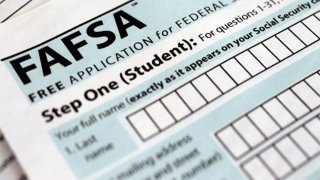
The Better Business Bureau is warning the public about the presence of scammers looking to take advantage of students and parents searching for financial aid opportunities.
As the June 30 federal FAFSA deadline approaches, many students are searching and applying for grants and scholarships to fund their college education, the BBB said.
The BBB said it receives numerous reports of scholarship scams every year.
One victim reported to BBB Scam Tracker that "the scholarship form requested a lot of personal information, which seemed standard for scholarship applications. After submitting my application, I heard nothing back and decided to research the company on their website and Facebook. I found that there were multiple complaints regarding the scholarship dating back to the 2016 competition and each complaint, no matter the year, received the same response - that there was a large and unexpected number of applications, and they did not have time to review and announce the winners, but they would do it soon. I do not believe that they have given out a single scholarship since 2016, yet they continue to post the application each year."
Get DFW local news, weather forecasts and entertainment stories to your inbox. Sign up for NBC DFW newsletters.
Due to the sensitive personal and financial information provided for scholarship and grant applications, it is important to be cautious when choosing one to apply for, the BBB said.
According to the BBB, more than 83% of the 2.46 million first-time, full-time students enrolled in postsecondary institutions during the 2018-2019 school year were awarded financial aid through federal grants, state and local grants, institutional grants or student loans.
To protect students and parents from falling victim to scholarship scams, Better Business Bureau recommends following these guidelines:
Texas News
News from around the state of Texas.
Beware Unsolicited Offers
According to the Better Business Bureau, it is rare to be awarded a scholarship or grant that was never applied for.
If you are contacted by an organization offering financial assistance, be sure to ask how the organization got your name and verify their claim with the source.
Never Pay to Apply for a Scholarship
Better Business Bureau said some companies may claim that they can make you eligible to get financial aid for a processing fee.
What they are really doing is filling out a free application on your behalf and will often falsify your information to ensure you receive funds, the Better Business Bureau said.
Falsifying personal information on certain applications like FAFSA is illegal and can carry fines up to $20,000.
Ask Questions
Ask questions about a scholarship or grant to help determine its legitimacy. If a company is reluctant to answer or provides vague responses, that is a sign it may be a scam, the Better Business Bureau said.
According to the Better Business Bureau, this is especially important if using a third-party service to locate and apply for scholarships.
Take Your Time
Spend the time to research an offered scholarship or grant using resources offered at your college or university like guidance counselors or financial aid offices. This can help to determine the legitimacy of the company offering financial assistance.
Beware Aggressive Tactics
The Better Business Bureau said no matter the scam, one of the most common tactics scammers use is to pressure victims to making an immediate decision. They may claim that the offer is only available for a limited time and to "buy now or miss this opportunity."
For scholarship scams, companies may offer false "guarantees" that you will get aid as long as you pay a service fee, the Better Business Bureau said.
Be Skeptical of Glowing Success Stories
While testimonials are often used by legitimate companies and businesses to demonstrate their successes, they may also be fabricated by scammers, the Better Business Bureau said.
Instead of making a decision to use a company based off of testimonials, the Better Business Bureau recommends asking if they have helped anyone in your community in the past year.
Apply for Grants and Scholarships Yourself
According to the Better Business Bureau, filling out and submitting applications yourself is one of the best ways to ensure that the information provided is accurate, complete, and controlled.
Applicants should ever pay anyone to fill out or process your FAFSA as it is most likely a scam, the Better Business Bureau said.
Students and parents and submit a FAFSA application online at StudentAid.gov.
For more information about how to avoid scholarship and financial aid scams, visit FTC.gov.
For a list of financial aid service companies the U.S. Department of Education works with, visit StudentAid.gov.
If you have been a victim of a scholarship scam, report it to BBB Scam Tracker. According to the Better Business Bureau, the information provided could prevent another person from falling victim.



